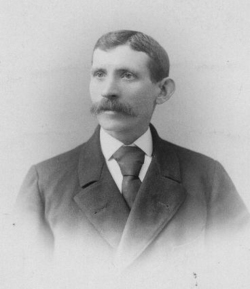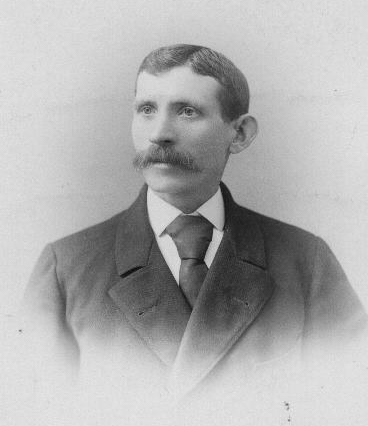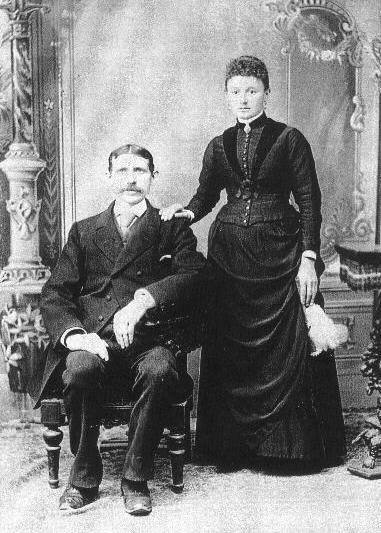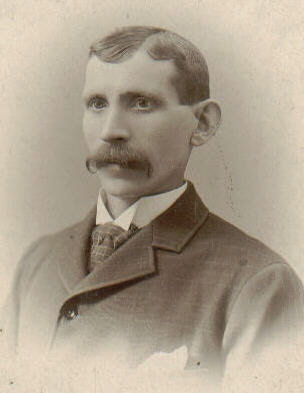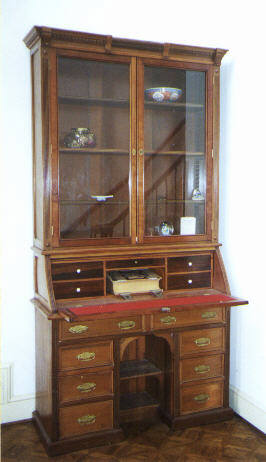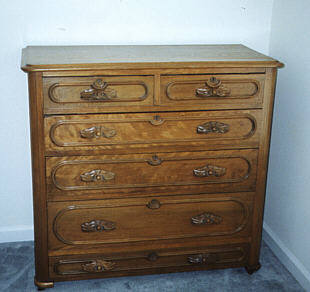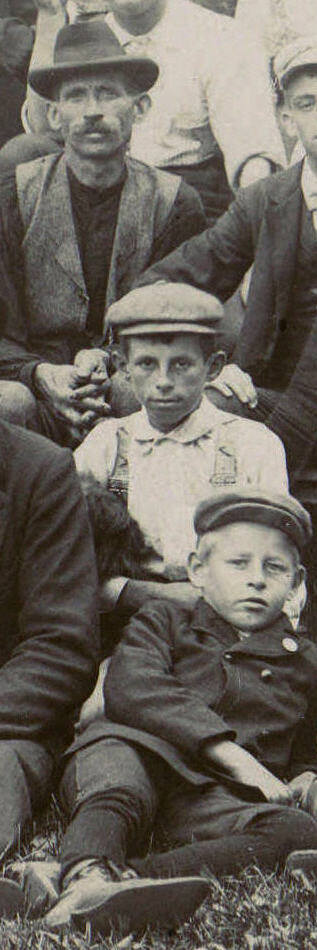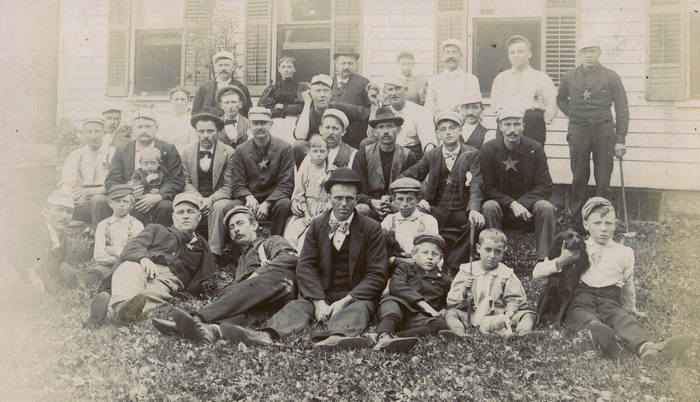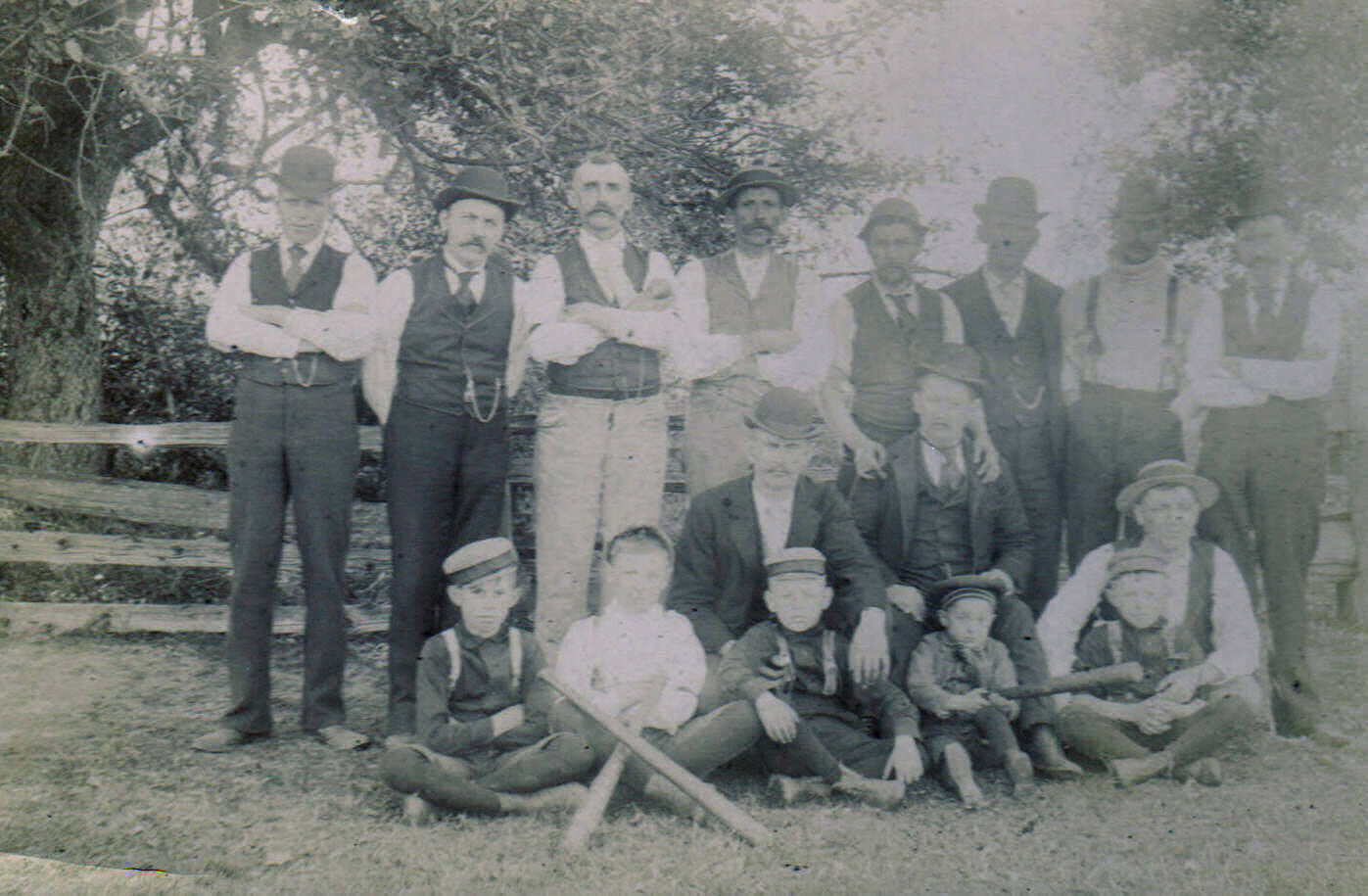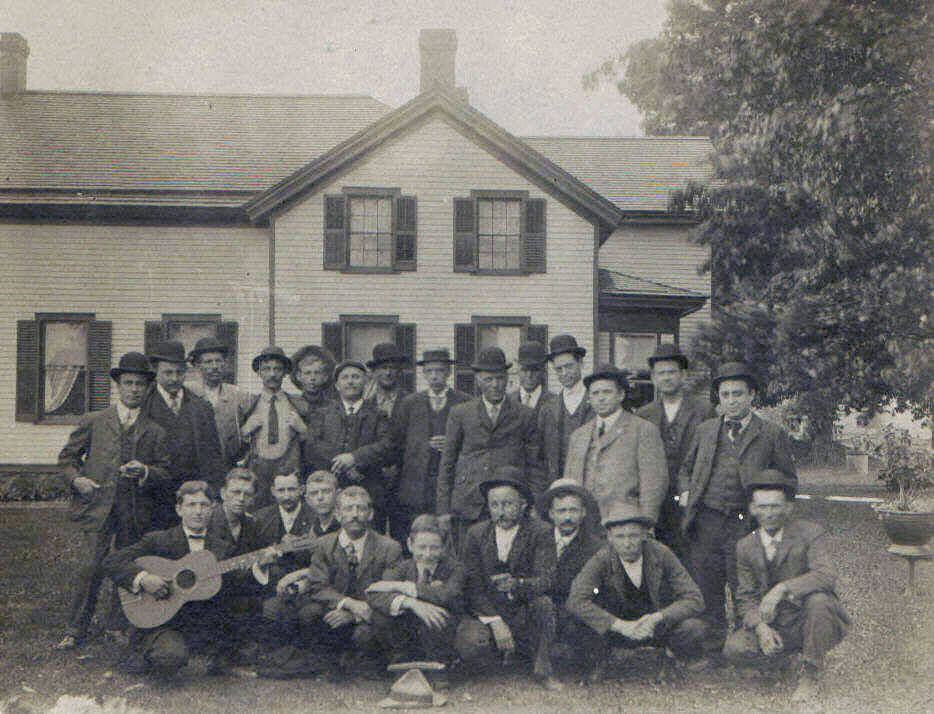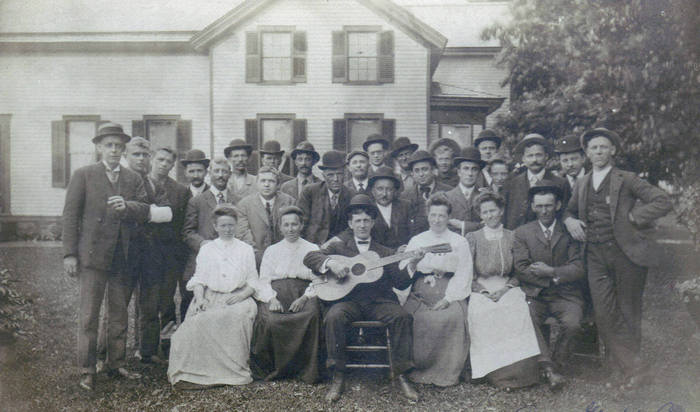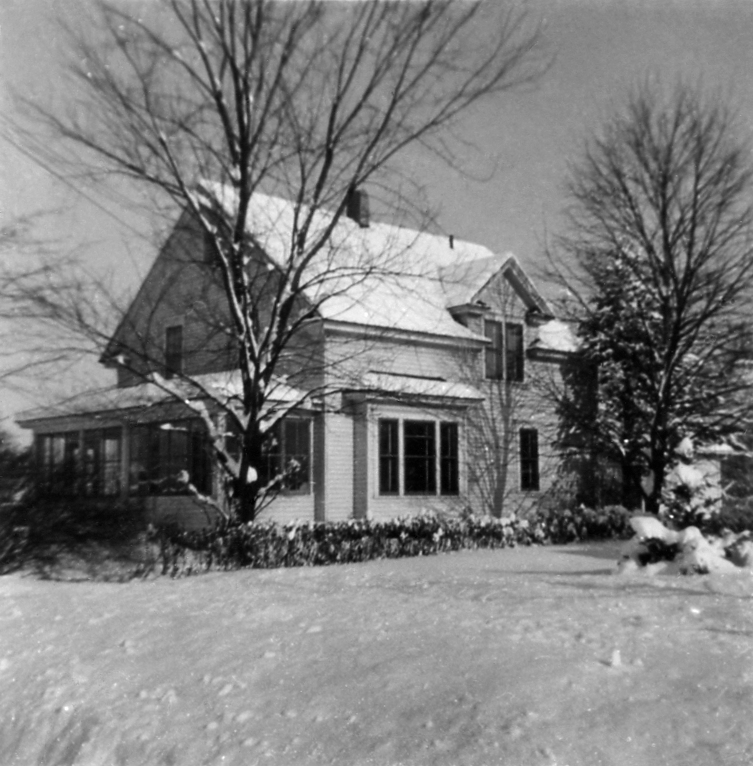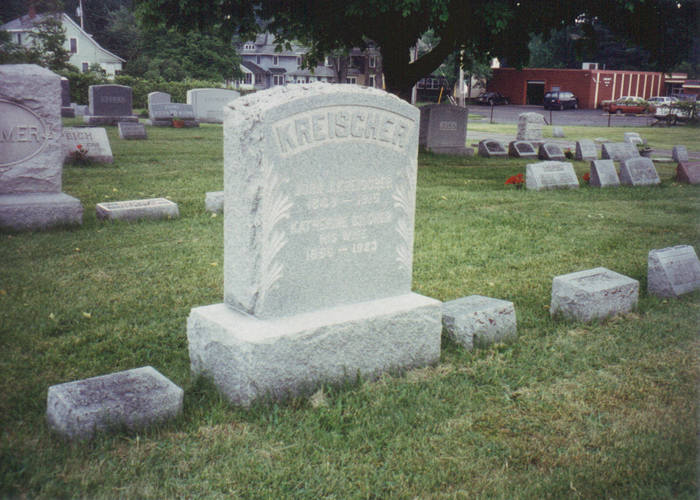Jacob undoubtedly attended the local village school(s) and then he became a "Schreiner," meaning a "joiner," or one who handcrafts and fits wooden furniture together. Not much is known of his early life, other than that he lived in Kirrweiler at his parents' home, made furniture that survived in Kirrweiler into the late 1900's, and, at least while in Germany as a young single man, was a sociable and humorous soul who liked the ladies. He also had a reputation then as a "Stromer," an informal Pfalzische dialect expression meaning a person who likes to roam here and there rather than sticking diligently to his work, as the industrious Germans were taught and expected to do.
Somehow he met Catharina Gilcher who lived in the village of Rathsweiler about three miles away. On 30 May 1883 (Catharina's 27th birthday) they sailed from Bremen, Germany on the S.S. "Elbe," headed for New York City with their infant son, Carl. Jacob was 34 years old, and the only Kreischer from his immediate family to ever emigrate from Germany. This couple, like so many German emigrants, relocated to the U.S. in search of more freedoms and better economic opportunities than Germany could then afford, where harvests were poor, land and housing were scarce, and large multigenerational families were crowded into ever-smaller, subdivided lots and homes.
The threesome arrived in New York City on 9 June 1883. Catharina and Jacob were married five days later in Syracuse, New York, on 14 June 1883, at the home of Catharina's cousins, Jacob and Caroline L. (Grub) Kohl, early Syracuse German settlers who ran a lager beer saloon and restaurant on North Salina Street. Pastor Emil Henckell of St. Peter's German Evangelische Lutheran Church performed the ceremony. The couple would remain together for 32 years.
Jacob and Catharina (now formally known in the U.S. as John Jacob and Katherine Kreischer) purchased and settled in a home on the south side of Putnam Street in southwest Syracuse, where Jacob set up his cabinetmaking/carpentry shop. (It was 16 and/or 14-1/2 Putnam before the address numbers changed in 1888; after that it was 221 Putnam). He supported the family by making furniture and working as a carpenter. They had two more sons while living on Putnam Street: Otto (born in 1884) and Alfred (born in 1886). After a few years the family became members of St. Paul's German Lutheran Church at the corner of Oswego and Shonnard Streets. Jacob Kreischer during these years served as a deacon at St. Paul's church (1890-1893) and was a member of the Syracuse Saengerbund (a prominent German singing society and social group).
On Christmas Day 1887, Jacob stood as godfather for his infant niece, Mabel Luise Gilcher (daughter of Katherine's brother Carl/Charles Gilcher and Philipina "Phoebe" Ludwig Gilcher) at the baptism performed by Pastor George Merschroth at St. Paul's Church. On 25 September 1888 Jacob Kreischer (and his wife and children) became naturalized U.S. citizens. Between 1890 and 1892 Jacob went into business with his brother-in-law Carl Gilcher and J. Klinck and Charles Mohr, making and selling children's shoes, but the business did not survive (perhaps a consequence of the Depression of 1893).
After 15 or so years working as a cabinetmaker and carpenter in Syracuse, Jacob bought his own farm and became a farmer for 20 years (realizing both the American and the German dream of owning his own farm?). Around 1895 the Kreischer family moved north out of the city and ended up purchasing a 37-acre parcel of land in Lot 92 of Cicero Township, situated just to the east of the village of North Syracuse, in the location then known as Taft Settlement (today, their land would lie along the east side of Church Street, generally between Hamilton and Taft Roads). It is thought that the Kreischers raised corn, tobacco, potatoes, tomatoes, peas, beans, carrots, squash, eggs, and fruit and sold it at the farmers' market on Syracuse's north side.
Jacob applied for and was issued a U.S. passport to travel abroad with his wife in 1899, but the passport was never signed and their names do not appear on any ship passenger lists. It would seem that, as successful farmers and landowners, Jacob and Katherine had wanted to revisit their families and friends in Germany, but never made the trip. Jacob was described on his passport as: Age: 50 years. Stature: 5 feet, 8 inches. Forehead: medium. Eyes: blueish. Nose: pointed. Mouth: natural. Chin: medium. Hair: blond. Complexion: light. Face: spare.
On 4 August 1900 Jacob accompanied his oldest son, Carl, to the U.S. Army recruitment office in Syracuse and gave his permission for Carl to enlist. On 29 September 1901 Jacob stood as godfather of George Jacob Gilcher, infant son of parents Carl Gilcher and his second wife, Barbara Joh. Again, their old friend Rev. Merschroth performed the baptism at St. Paul's Church in Syracuse. Carl and Barbara Gilcher and their children would live on the Kreischer farm for awhile when they fell on hard times. One of their children would later tell of hearing Jacob Kreischer swearing at an oncoming thunderstorm threatening his crops.
Katherine and Jacob became members of the Taft Settlement Grange, a local affiliate of a national farmers' educational and social society. They were instrumental in helping plan, rebuild, and refurnish the new Grange Hall when the old one burned down on 25 June 1908. Jacob was a Trustee of the Grange from January 1909 until his death, and took care of such arrangements as fixing the chimney, painting, taking care of locks, and having photographs made. Among many of the entertainments Jacob helped provide at the Grange was a debate held on 19 March 1910: "The City Life or the Country Life?" According to the minute books, "Brother Kreischer" took the country side and "Brother Welch" took the city side. Not surprisingly, the judges decided in favor of the country being the best place to live!
In later years Kreischer Road in North Syracuse, its north end at the foot of the old Kreischer family farmhouse, would be named after Jacob and Katherine, in large part because of their activities and hospitality devoted to the benefit of their community.
In 1911 Jacob and Katherine's oldest son, Carl, moved back to the Kreischer farm with his wife, Nellie, and their three young children. They intended to help run the farm, and moved into the old farmhouse. Jacob had built a smaller new home for himself and Katherine (later it was sold to the Fleischer family; today, 509? Church Street, North Syracuse).
Jacob became sick in August 1914, as noted in the Taft Grange minute books. His obituary would say that he died following an illness of two years, and was confined to his bed for his final nine weeks. He may have been paralyzed following a stroke. He died at the age of 66 years on Thursday, 26 August 1915 from "General paralysis from cerebral hemorrhage," with "Indirect Cause of Death: Atheroma" (i.e. arteriosclerosis). His funeral was held Sunday afternoon, 29 August 1915 at 2:30 o'clock at his home, with burial following that day at North Syracuse Cemetery. He left behind his wife, three sons, and three small grandchildren living on the Kreischer farm.
The Taft Settlement Grange passed the following resolution:
In memoriam of brother
J.J. Kreischer
Like the flowers and leaves our
brothers and sisters are constantly
falling around us: and today
we miss from among us our
worthy and esteemed brother
J.J. Kreischer: one who was always
faithful in attendance at the grange
till failing health forbade
Resolved
That in the death of this worthy brother
the grange loses one who was ever
ready to lend a helping hand in all
the work of the grange.
Resolved
that Taft settlement grange, realizing
their loss unite in extending their sympathy
to the bereaved wife and family and
commend them to Him who doeth all things
well
Resolved
that a copy of these resolutions be forwarded
to the family: and spread on a memorial
page of our records.
Leaves have their time to fall
And flowers to wither in the north winds breath
But all thou hast all seasons for thine own oh death.
H.J. Welch, committee
The Syracuse Saengerbund sent the following message (here, translated from the original German):
Syracuse Saengerbund
Syracuse, N.Y. Sept. 1, 1915
Condolence Resolution
As it pleased the Lord over life and death to call our worthy brother and loyal member John Kreischer
from our midst into a better beyond, we dedicate our deepest sympathy to the spouse and family
at this time of tragic loss, and it is herewith agreed that a sheet in the minutes-book shall be
dedicated to the memory of the deceased. A copy of this agreement is to be sent to the bereaved.
(signed) Louis Maier
Secretary.
St. Paul's Church ran the following published notice:
Last Sunday afternoon we laid to rest the remains of Johann Jakob Kreischer of North Syracuse at the age of 66 years. The brother had been [confined] to his house for over a year, but was relieved from his suffering August 26th when his spirit departed in faith and confidence to his home prepared for him by his Lord and Savior. He leaves to mourn his faithful wife with whom he [journeyed] through life for 32 years, and three sons. His armchair is vacant, as well as his place in our Church. He has finished the fight, he kept the Faith, the promise is his--The Crown of Glory.
-----
Genealogical note: Jacob Kreischer was the second cousin of another immigrant Kreischer to Syracuse, Lorenz Kreischer, who arrived the year after Jacob, Katherine, and Carl did. Their common ancestors were their great-grandparents, Phillip Peter Kreischer (born 1752 in Hausweiler, died date unknown in Merzweiler), a farmer in Kirrweiler, Kreis Kusel, Germany, and his wife, Elisabetha Margaretha Meckler (per Jean Kreischer, 2007).
He was also related (fifth cousin once removed) to earlier Syracuse immigrant Friedrich Kreischer (Jean Kreischer, 2010).
Jacob undoubtedly attended the local village school(s) and then he became a "Schreiner," meaning a "joiner," or one who handcrafts and fits wooden furniture together. Not much is known of his early life, other than that he lived in Kirrweiler at his parents' home, made furniture that survived in Kirrweiler into the late 1900's, and, at least while in Germany as a young single man, was a sociable and humorous soul who liked the ladies. He also had a reputation then as a "Stromer," an informal Pfalzische dialect expression meaning a person who likes to roam here and there rather than sticking diligently to his work, as the industrious Germans were taught and expected to do.
Somehow he met Catharina Gilcher who lived in the village of Rathsweiler about three miles away. On 30 May 1883 (Catharina's 27th birthday) they sailed from Bremen, Germany on the S.S. "Elbe," headed for New York City with their infant son, Carl. Jacob was 34 years old, and the only Kreischer from his immediate family to ever emigrate from Germany. This couple, like so many German emigrants, relocated to the U.S. in search of more freedoms and better economic opportunities than Germany could then afford, where harvests were poor, land and housing were scarce, and large multigenerational families were crowded into ever-smaller, subdivided lots and homes.
The threesome arrived in New York City on 9 June 1883. Catharina and Jacob were married five days later in Syracuse, New York, on 14 June 1883, at the home of Catharina's cousins, Jacob and Caroline L. (Grub) Kohl, early Syracuse German settlers who ran a lager beer saloon and restaurant on North Salina Street. Pastor Emil Henckell of St. Peter's German Evangelische Lutheran Church performed the ceremony. The couple would remain together for 32 years.
Jacob and Catharina (now formally known in the U.S. as John Jacob and Katherine Kreischer) purchased and settled in a home on the south side of Putnam Street in southwest Syracuse, where Jacob set up his cabinetmaking/carpentry shop. (It was 16 and/or 14-1/2 Putnam before the address numbers changed in 1888; after that it was 221 Putnam). He supported the family by making furniture and working as a carpenter. They had two more sons while living on Putnam Street: Otto (born in 1884) and Alfred (born in 1886). After a few years the family became members of St. Paul's German Lutheran Church at the corner of Oswego and Shonnard Streets. Jacob Kreischer during these years served as a deacon at St. Paul's church (1890-1893) and was a member of the Syracuse Saengerbund (a prominent German singing society and social group).
On Christmas Day 1887, Jacob stood as godfather for his infant niece, Mabel Luise Gilcher (daughter of Katherine's brother Carl/Charles Gilcher and Philipina "Phoebe" Ludwig Gilcher) at the baptism performed by Pastor George Merschroth at St. Paul's Church. On 25 September 1888 Jacob Kreischer (and his wife and children) became naturalized U.S. citizens. Between 1890 and 1892 Jacob went into business with his brother-in-law Carl Gilcher and J. Klinck and Charles Mohr, making and selling children's shoes, but the business did not survive (perhaps a consequence of the Depression of 1893).
After 15 or so years working as a cabinetmaker and carpenter in Syracuse, Jacob bought his own farm and became a farmer for 20 years (realizing both the American and the German dream of owning his own farm?). Around 1895 the Kreischer family moved north out of the city and ended up purchasing a 37-acre parcel of land in Lot 92 of Cicero Township, situated just to the east of the village of North Syracuse, in the location then known as Taft Settlement (today, their land would lie along the east side of Church Street, generally between Hamilton and Taft Roads). It is thought that the Kreischers raised corn, tobacco, potatoes, tomatoes, peas, beans, carrots, squash, eggs, and fruit and sold it at the farmers' market on Syracuse's north side.
Jacob applied for and was issued a U.S. passport to travel abroad with his wife in 1899, but the passport was never signed and their names do not appear on any ship passenger lists. It would seem that, as successful farmers and landowners, Jacob and Katherine had wanted to revisit their families and friends in Germany, but never made the trip. Jacob was described on his passport as: Age: 50 years. Stature: 5 feet, 8 inches. Forehead: medium. Eyes: blueish. Nose: pointed. Mouth: natural. Chin: medium. Hair: blond. Complexion: light. Face: spare.
On 4 August 1900 Jacob accompanied his oldest son, Carl, to the U.S. Army recruitment office in Syracuse and gave his permission for Carl to enlist. On 29 September 1901 Jacob stood as godfather of George Jacob Gilcher, infant son of parents Carl Gilcher and his second wife, Barbara Joh. Again, their old friend Rev. Merschroth performed the baptism at St. Paul's Church in Syracuse. Carl and Barbara Gilcher and their children would live on the Kreischer farm for awhile when they fell on hard times. One of their children would later tell of hearing Jacob Kreischer swearing at an oncoming thunderstorm threatening his crops.
Katherine and Jacob became members of the Taft Settlement Grange, a local affiliate of a national farmers' educational and social society. They were instrumental in helping plan, rebuild, and refurnish the new Grange Hall when the old one burned down on 25 June 1908. Jacob was a Trustee of the Grange from January 1909 until his death, and took care of such arrangements as fixing the chimney, painting, taking care of locks, and having photographs made. Among many of the entertainments Jacob helped provide at the Grange was a debate held on 19 March 1910: "The City Life or the Country Life?" According to the minute books, "Brother Kreischer" took the country side and "Brother Welch" took the city side. Not surprisingly, the judges decided in favor of the country being the best place to live!
In later years Kreischer Road in North Syracuse, its north end at the foot of the old Kreischer family farmhouse, would be named after Jacob and Katherine, in large part because of their activities and hospitality devoted to the benefit of their community.
In 1911 Jacob and Katherine's oldest son, Carl, moved back to the Kreischer farm with his wife, Nellie, and their three young children. They intended to help run the farm, and moved into the old farmhouse. Jacob had built a smaller new home for himself and Katherine (later it was sold to the Fleischer family; today, 509? Church Street, North Syracuse).
Jacob became sick in August 1914, as noted in the Taft Grange minute books. His obituary would say that he died following an illness of two years, and was confined to his bed for his final nine weeks. He may have been paralyzed following a stroke. He died at the age of 66 years on Thursday, 26 August 1915 from "General paralysis from cerebral hemorrhage," with "Indirect Cause of Death: Atheroma" (i.e. arteriosclerosis). His funeral was held Sunday afternoon, 29 August 1915 at 2:30 o'clock at his home, with burial following that day at North Syracuse Cemetery. He left behind his wife, three sons, and three small grandchildren living on the Kreischer farm.
The Taft Settlement Grange passed the following resolution:
In memoriam of brother
J.J. Kreischer
Like the flowers and leaves our
brothers and sisters are constantly
falling around us: and today
we miss from among us our
worthy and esteemed brother
J.J. Kreischer: one who was always
faithful in attendance at the grange
till failing health forbade
Resolved
That in the death of this worthy brother
the grange loses one who was ever
ready to lend a helping hand in all
the work of the grange.
Resolved
that Taft settlement grange, realizing
their loss unite in extending their sympathy
to the bereaved wife and family and
commend them to Him who doeth all things
well
Resolved
that a copy of these resolutions be forwarded
to the family: and spread on a memorial
page of our records.
Leaves have their time to fall
And flowers to wither in the north winds breath
But all thou hast all seasons for thine own oh death.
H.J. Welch, committee
The Syracuse Saengerbund sent the following message (here, translated from the original German):
Syracuse Saengerbund
Syracuse, N.Y. Sept. 1, 1915
Condolence Resolution
As it pleased the Lord over life and death to call our worthy brother and loyal member John Kreischer
from our midst into a better beyond, we dedicate our deepest sympathy to the spouse and family
at this time of tragic loss, and it is herewith agreed that a sheet in the minutes-book shall be
dedicated to the memory of the deceased. A copy of this agreement is to be sent to the bereaved.
(signed) Louis Maier
Secretary.
St. Paul's Church ran the following published notice:
Last Sunday afternoon we laid to rest the remains of Johann Jakob Kreischer of North Syracuse at the age of 66 years. The brother had been [confined] to his house for over a year, but was relieved from his suffering August 26th when his spirit departed in faith and confidence to his home prepared for him by his Lord and Savior. He leaves to mourn his faithful wife with whom he [journeyed] through life for 32 years, and three sons. His armchair is vacant, as well as his place in our Church. He has finished the fight, he kept the Faith, the promise is his--The Crown of Glory.
-----
Genealogical note: Jacob Kreischer was the second cousin of another immigrant Kreischer to Syracuse, Lorenz Kreischer, who arrived the year after Jacob, Katherine, and Carl did. Their common ancestors were their great-grandparents, Phillip Peter Kreischer (born 1752 in Hausweiler, died date unknown in Merzweiler), a farmer in Kirrweiler, Kreis Kusel, Germany, and his wife, Elisabetha Margaretha Meckler (per Jean Kreischer, 2007).
He was also related (fifth cousin once removed) to earlier Syracuse immigrant Friedrich Kreischer (Jean Kreischer, 2010).
Inscription
Four markers, all in a row, viewed left to right:
1. Small chunky flat marker: "CARL / 1882-1925"
2. Large marker, upright with base: "KREISCHER / JOHN J. KREISCHER / 1849-1915 / KATHERINE GILCHER / HIS WIFE / 1856-1923"
3. Small chunky flat marker: "MOTHER"
4. Small chunky flat marker: "FATHER"
